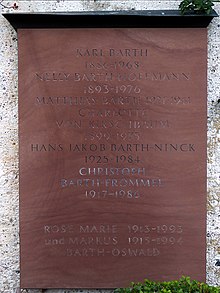Charlotte von Kirschbaum
Charlotte von Kirschbaum | |
|---|---|
| Born | June 25, 1899 Ingolstadt |
| Died | July 24, 1975 Riehen |
| Occupation | Opinion writer |
Charlotte von Kirschbaum (June 25, 1899 – July 24, 1975)[1][2] was a German theologian, and assisted Karl Barth in writing the Church Dogmatics. Charlotte von Kirschbaum was born in Ingolstadt. In 1916 her father died in the war, which inspired her to be trained as a nurse. In 1924 she met Karl Barth, and initially became his pupil and later contributed to all of Karl Barth's academic publications.
Relationship with Karl Barth and Nelly Hoffman-Barth
Charlotte von Kirschbaum and Barth met at the University of Göttingen in 1924, when she was 25 years old, at the time she was a Red Cross nurse and had an interest in theology and economically destitute.
Charlotte von Kirschbaum was introduced to Karl Barth and his writings in the early 1920s.[3][4] By 1929 she was working full-time for Barth as a secretary and assistant preparing his lectures. In October 1929 she moved into the Barth household with Barth's wife Nelly and children to continue academic theological work[5], where she remained until 1966.[4] Charlotte and Barth cowrote the Church Dogmatics and many other theological works while she resided in the Barth household, and Barth's children referred to her as "Aunt Lollo"[6]. Charlotte von Kirschbaum's presence in the Barth household resulted in duress in the family at times, and has been a matter of vast speculation[7]. However, after Karl Barth had died, Nelly Barth continued to visit Charlotte von Kirschbaum in the hospital[8].
Church Dogmatics
Charlotte von Kirschbaum coauthored the Church Dogmatics with Karl Barth. Although she is not listed as an author on the published works, Karl Barth admits that the Church Dogmatics would not have been written without her in the preface to CD III/3 he wrote:
"I should not like to conclude this Preface without expressly drawing the attention of readers of these seven volumes to what they and I owe to the twenty years of work quietly accomplished at my side by Charlotte von Kirschbaum. She has devoted no less of her life and powers to the growth of this work than I have myself. Without her co-operation it could not have been advanced from day to day, and I should hardly dare contemplate the future which may yet remain to me. I know what it really means to have a helper."[9]
Work with Karl Barth
For the sake of the work she learned Latin, Greek and Hebrew.[citation needed] She also attended the philosophical lectures of Heinrich Scholz.[citation needed] She made an important contribution to the production of Barth's Church Dogmatics.[citation needed] In 1935 Barth moved to Basel, Switzerland, followed by Charlotte.[citation needed] From there they supported the German Resistance.[citation needed]
Theological work
In 1949 her theological book Die wirkliche Frau (The Real Woman) was published. It discussed the role of women.
End of life and burial

In the early 1962, Charlotte von Kirschbaum became ill and moved to a nursing home in Riehen, and was hospitalized for the rest of her life[10] and she died ten years later. Nelly Hoffman buried Charlotte von Kirschbaum in the Barth family tomb where Karl Barth was previously buried and where Nelly was later buried too.
Writings
- von Kirschbaum, Charlotte (1996), The Question of Woman: The Collected Writings of Charlotte Von Kirschbaum, Eerdmans, ISBN 0-8028-4142-2.
References
- ^ Karl Barth: His Life from Letters and Autobiographical Texts
- ^ FemBio
- ^ "A Bright and Bleak Constellation: Karl Barth, Nelly Barth and Charlotte von Kirschbaum". The PostBarthian. 2017-10-09. Retrieved 2019-04-05.
- ^ a b Suzanne Selinger (1 January 1998). Charlotte Von Kirschbaum and Karl Barth: A Study in Biography and the History of Theology. Penn State Press. pp. 2–, 9–. ISBN 0-271-01864-X.
- ^ "A Bright and Bleak Constellation: Karl Barth, Nelly Barth and Charlotte von Kirschbaum". The PostBarthian. 2017-10-09. Retrieved 2019-04-05.
- ^ "A Bright and Bleak Constellation: Karl Barth, Nelly Barth and Charlotte von Kirschbaum". The PostBarthian. 2017-10-09. Retrieved 2019-04-05.
- ^ "A Bright and Bleak Constellation: Karl Barth, Nelly Barth and Charlotte von Kirschbaum". The PostBarthian. 2017-10-09. Retrieved 2019-04-05.
- ^ "A Bright and Bleak Constellation: Karl Barth, Nelly Barth and Charlotte von Kirschbaum". The PostBarthian. 2017-10-09. Retrieved 2019-04-05.
- ^ "The Life of Karl Barth: Church Dogmatics Vol III: The Doctrine of Creation 1945-1951 (Part 6)". The PostBarthian. 2019-04-04. Retrieved 2019-04-05.
- ^ "A Bright and Bleak Constellation: Karl Barth, Nelly Barth and Charlotte von Kirschbaum". The PostBarthian. 2017-10-09. Retrieved 2019-04-05.
Sources
- Busch, Eberhard (1975), Karl Barths Lebenslauf, nach seinen Briefen und autobiographischen Texten [Karl Barth’s biography, according to his letters and autobiographical texts] (in German), München: Christian Kaiser.
Further reading
- Köbler, Renate (1989), In the Shadow of Karl Barth: Charlotte Von Kirschbaum, Westminster John Knox Press, ISBN 0-664-25072-6.
- ——— (1991), In de schaduw van Karl Barth: Charlotte von Kirschbaum [In the Shadow of Karl Barth: Charlotte Von Kirschbaum] (in Dutch), transl Inge Scholtheis, Kampen: Uitgeverij Kok Pharos, ISBN 90-242-3327-5.
- Selinger, Suzanne (1998), Charlotte von Kirschbaum and Karl Barth: A Study in Biography and the History of Theology, Penn State University Press, ISBN 0-271-01824-0, archived from the original on 2014-07-29, retrieved 2014-07-23.
- Hunsinger, George, "Charlotte von Kirschbaum and Karl Barth: Suzanne Selinger, Charlotte von Kirschbaum and Karl Barth: A Study in Biography and the History of Theology (University Park, PA: Pennsylvania State University Press, 1998), viii + 206pp. $29.00", Center for Barth studies (review), Princeton Theological Seminary library.
